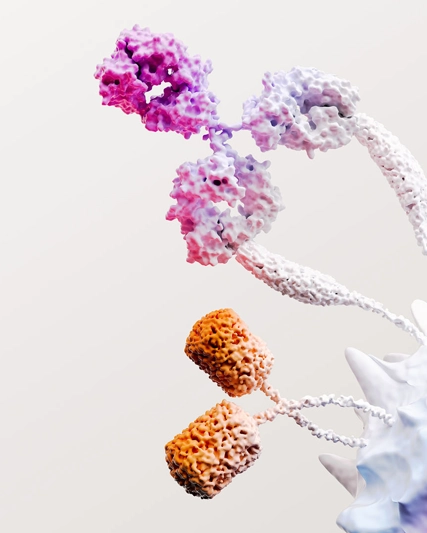GSK to present new data from the B-Clear phase IIb trial for bepirovirsen in chronic hepatitis B at the International Liver Congress 2022
For investors and media only
Further phase II data to be shared on linerixibat for cholestatic pruritus in primary biliary cholangitis
Issued: London UK
GSK plc will present 12 abstracts at the European Association for the Study of the Liver’s International Liver Congress 2022, taking place on June 22-26 in London. GSK’s presence will focus on two novel investigational specialty medicines, bepirovirsen, an antisense oligonucleotide for chronic hepatitis B (CHB), and linerixibat, an ileal bile acid transporter (IBAT) inhibitor for cholestatic pruritus in primary biliary cholangitis (PBC).
Chris Corsico, SVP, Development, GSK said: “New data being shared at this year’s International Liver Congress support our ambition to deliver novel medicines for patients with significant unmet medical need, such as those who suffer from chronic hepatitis B and cholestatic pruritus in primary biliary cholangitis. We look forward to engaging with the global hepatology community to share the exciting progress we have made for these patients.”
Updates from the bepirovirsen clinical trial programme
New interim analysis data to be shared from the randomised B-Clear phase IIb trial evaluating the efficacy and safety of bepirovirsen in patients with chronic hepatitis B virus infection on and off stable nucleos(t)ide analogue therapy. Data from this trial will be presented as part of the Late Breaker oral presentation session on June 25 (ILC oral # LB004A, LB004B).
Additional presentations from the bepirovirsen development programme include:
- Preclinical evidence that bepirovirsen harbours intrinsic immunostimulatory activity via Toll-like receptor 8 (TLR8), correlating with clinical efficacy from the study (ILC abstract #3635/ SAT439)
- Mechanistic pharmacokinetic and pharmacodynamic modelling of the simultaneous effects of bepirovirsen on hepatitis B surface antigen (HBsAg) and alanine transaminase (ALT) changes in CHB (ILC abstract #3592/ SAT441).
Data from these trials reflect GSK’s ambition to contribute to the development of a functional cure for people living with CHB and reduce the disease burden for patients.
Updates from the linerixibat clinical trial programme
New analysis to be presented from the GLIMMER phase II trial comparing the health-related quality of life of patients with cholestatic pruritus in PBC to several more common diseases, using EQ-5D, a standardised measure of health utility. The data from this analysis demonstrate that severe cholestatic pruritus in PBC has a negative impact on health utility that is similar to severe Parkinson’s disease (ILC abstract #1916/ THU470).
Full list of GSK’s presentations at the European Association for the Study of the Liver’s International Liver Congress 2022:
Bepirovirsen
| Abstract Name | Presenter | Presentation Details |
|---|---|---|
|
Efficacy and safety of bepirovirsen in patients with chronic hepatitis B virus infection: interim results from the randomised phase 2b B-Clear study |
Man-Fung Yuen
|
Oral (LB004A, LB004B) |
|
Efficacy and safety of bepirovirsen in patients with chronic hepatitis B virus infection not on stable nucleos(t)ide analogue therapy: interim results from the randomised phase 2b B-Clear study
|
Seng-Gee Lim |
Poster (3595/ SAT452) |
|
Efficacy and safety of bepirovirsen in patients with chronic hepatitis B virus infection on stable nucleos(t)ide analogue therapy: interim results from the randomised phase 2b B-Clear study
|
Man-Fung Yuen
|
Poster (3629/ SAT453) |
|
Evaluation Of Quantitative HBsAg Levels In Chronic Hepatitis B – A Targeted Literature Review
|
Vera Gielen
|
Poster (1850/ SAT405) |
|
Characterisation of baseline complement values in patients with chronic hepatitis B virus infection in the phase IIb B-Clear study
|
Jennifer Cremer
|
Poster (1994/ THU390) |
|
Characteristics and renal function in patients with chronic hepatitis B virus infection: baseline data from the phase 2b B-Clear study
|
Seng-Gee Lim
|
Poster (1879/ THU389) |
|
Distribution of patients by guideline-defined disease phase and/or grey zones in B-Clear, an international multi-centre clinical trial
|
Seng-Gee Lim
|
Poster (2127/ THU393) |
|
Bepirovirsen, antisense oligonucleotide (ASO) against hepatitis B virus (HBV), harbors intrinsic immunostimulatory activity via Toll-like receptor 8 (TLR8) preclinically, correlating with clinical efficacy from the Phase 2a study
|
Shihyun You
|
Poster (3635/ SAT439) |
|
Mechanistic Pharmacokinetics/Pharmacodynamics modelling of the simultaneous effects of bepirovirsen on Hepatitis B surface antigen (HBsAg) and alanine transaminase (ALT) changes in Chronic Hepatitis B (CHB) patients: Analysis of Phase 2b study to inform Phase 3 decision-making
|
Ahmed Nader
|
Poster (3592/ SAT441) |
|
Combination treatment of a PAPD5/7 inhibitor with an antisense oligonucleotide bepirovirsen with concurrent dosing shows additive HBsAg decreases in the AAV-HBV mouse model |
Martin Leivers |
Poster (3590/ SAT451) |
Linerixibat
| Abstract Name | Presenter | Presentation Details |
|---|---|---|
|
More than just an itch: Impact of cholestatic pruritus in primary biliary cholangitis (PBC) on health-related quality of life (HRQoL)
|
Helen Smith
|
Poster (1916/ THU470) |
|
Linerixibat dose-response analysis of C4 concentrations as a quantitative approach to predict gastrointestinal tolerability
|
Fernando Carreño |
Poster (2056/ THU472) |
|
Investigation of linerixibat 40mg BID for cholestatic pruritus of primary biliary cholangitis (PBC); further data from the Phase 2b GLIMMER study to support the Phase 3 GLISTEN study
|
James Fettiplace
|
Poster (3606/ THU485) |
About chronic hepatitis B
Hepatitis B is a viral infection of the liver, caused by the hepatitis B virus (HBV), it can cause both acute and chronic liver disease.[1] Chronic hepatitis B (CHB) is a long-lasting infection and occurs when the body’s immune system is unable to fight off the virus and it persists in the blood and liver.[2] It is estimated that there are 296 million people globally living with CHB.1 Even when treated, CHB can progress to liver complications including cirrhosis and liver cancer, which results in nearly 900,000 deaths per year.[2]
Viral suppression is the current goal for treatment of CHB. However, viral replicative activity may return upon cessation of treatment requiring lifelong therapy to prevent viral rebound. The concept of functional cure of CHB aims to eliminate the virus from circulating in the blood and prevent any disease activity in the liver. As only a limited number of patients currently treated for CHB achieve HBsAg loss, considered the hallmark for achieving functional cure, development of therapeutic approaches to reach functional cure are needed.
About cholestatic pruritus in primary biliary cholangitis
In primary biliary cholangitis (PBC), a cholestatic liver disease, bile flow from the liver is disrupted. The resulting excess bile acids in circulation are thought to play a causal role in cholestatic pruritus, an internal itch that cannot be relieved by scratching. Cholestatic pruritus is a serious condition and can be debilitating to quality of life, with patients experiencing sleep disturbances, fatigue, suicidal ideation and even sometimes requiring liver transplantation in the absence of liver failure. Current treatment options for PBC do not address cholestatic itch. There have been no new pharmacologic therapies approved for cholestatic pruritus associated with PBC since the 1960s.
About linerixibat (GSK2330672)
Linerixibat is an investigational product for the treatment of cholestatic pruritus in patients with PBC, currently enrolling the GLISTEN phase III trial (www.glistentrial.com). The US Food and Drug Administration and the European Medicines Agency have granted orphan drug designation for linerixibat in the treatment of PBC and associated cholestatic pruritus. Linerixibat is a minimally absorbed small molecule inhibitor of IBAT, administered as an oral tablet. By blocking reabsorption of bile acids in the small intestine, linerixibat reduces pruritic bile acids in circulation.
About GSK
GSK is a science-led global healthcare company. For further information please visit www.gsk.com/en-gb/company/.
Cautionary statement regarding forward-looking statements
GSK cautions investors that any forward-looking statements or projections made by GSK, including those made in this announcement, are subject to risks and uncertainties that may cause actual results to differ materially from those projected. Such factors include, but are not limited to, those described in the Company's Annual Report on Form 20-F for 2021, GSK’s Q1 Results for 2022 and any impacts of the COVID-19 pandemic.
References
[1] World Health Organisation. Hepatitis B Key Facts, June 2022
[2] World Health Organization. Global Hepatitis Report, 2017


